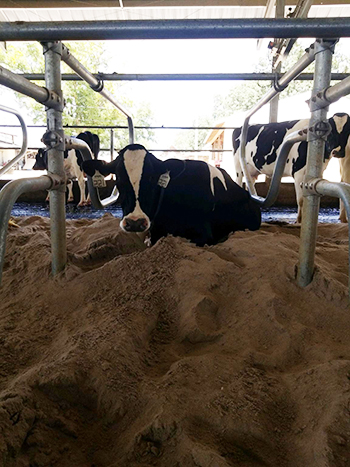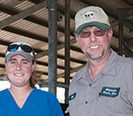
Nearly every year we have had severe heat stress within our dry cow group. This happened for the most part because they were used to living life during lactation inside the freestall barn being cooled with fans and sprinklers. Starting this year, we have been able to keep our dry cows inside the barn, too.
We learned a few years back that we would have to change some of our protocols for the dry cows. Our original protocols consisted of:
1. A dry-off pregnancy check.
2. Two sets of vaccines.
3. Hoof trimming.
4. Dry cow intramammary treatment.
5. An intramammary teat sealant.
Take this combination and add the heat adjustment of 100°F with 100% humidity. On top of that, they went from a total mixed ration to a grass, hay, and once a day corn grain mix. Adding all of these things together created a recipe for disaster.
At one point, we were losing a couple dry cows a week. We had vets on standby, universities stepping in to help, and pharmaceutical company field reps trying to do research to figure out a different plan.
When you administer a vaccine into a cow, their temperature over the next 24 to 48 hours usually will rise in reaction to the vaccine. We believe that this, along with the extreme heat stress shock to their system, caused us to lose some very good cows over the summer the last few years.
With the help of everyone coming together to conjure up a plan, we decided to move the vaccines and pregnancy check back a week, while the cows were still in the freestall barn and in the milking herd. By making this change, our loss of dry cattle was pretty much eliminated.
Now that we keep our dry cows in a controlled environment year round, we decided to go back to the original protocol so that we only have to interact with them one time. We have quickly learned that even though the environment for these cows is better, we are still having some issues with that protocol. So, we will return to giving vaccines and palpating cows one week prior to dry off.
The heat in Georgia is a big deal. It controls a lot of different aspects around our farm. Our number one priority are these ladies, and we will do whatever it takes to make them safe and healthy.

Mark and Caitlin Rodgers are dairy farmers in Dearing, Georgia. Their “Father and Daughter Dairy Together” column appears every other Thursday on HD Notebook. The Rodgers have a 400-cow dairy that averages 32,000 pounds of milk. Follow their family farm on Facebook at Hillcrest Farms Inc.